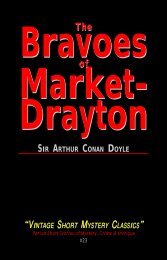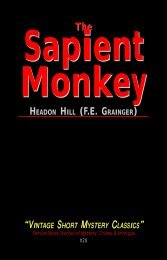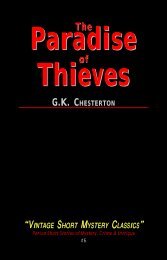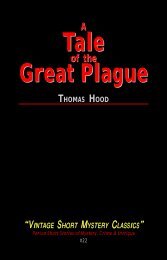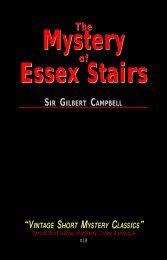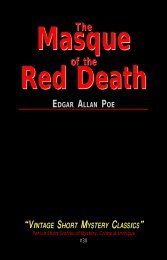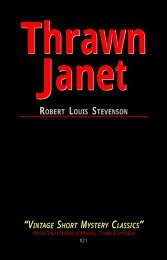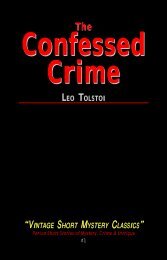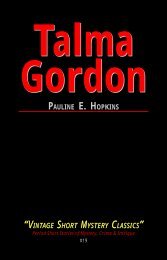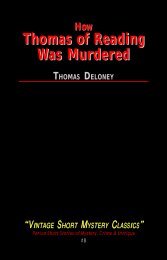The North Mail - Hornpipe Vintage Publications
The North Mail - Hornpipe Vintage Publications
The North Mail - Hornpipe Vintage Publications
You also want an ePaper? Increase the reach of your titles
YUMPU automatically turns print PDFs into web optimized ePapers that Google loves.
<strong>The</strong> <strong>North</strong> <strong>Mail</strong>(<strong>The</strong> Phantom Coach)<strong>The</strong> circumstances I am about to relate to you havetruth to recommend them. <strong>The</strong>y happened to myself,and my recollection of them is as vivid as ifthey had taken place only yesterday. Twenty years, however,have gone by since that night. During those twentyyears I have told the story to but one other person. I tell itnow with a reluctance which I find it difficult to overcome.All I entreat, meanwhile, is that you will abstainfrom forcing your own conclusions upon me. I want nothingexplained away. I desire no arguments. My mind onthis subject is quite made up, and, having the testimonyof my own senses to rely upon, I prefer to abide by it.Well! It was just twenty years ago, and within a dayor two of the end of the grouse season. I had been out allday with my gun, and had had no sport to speak of. <strong>The</strong>wind was due east; the month, December; the place, ableak wide moor in the far north of England. And I hadlost my way. It was not a pleasant place in which to loseone’s way, with the first feathery flakes of a coming snowstormjust fluttering down upon the heather, and theleaden evening closing in all around. I shaded my eyeswith my hand, and stared anxiously into the gatheringdarkness, where the purple moorland melted into a rangeof low hills, some ten or twelve miles distant. Not thefaintest smoke-wreath, not the tiniest cultivated patch, orfence, or sheep-track, met my eyes in any direction. <strong>The</strong>rewas nothing for it but to walk on, and take my chance of
<strong>The</strong> <strong>North</strong> <strong>Mail</strong> 3the sleep of death? Death! I shuddered. How hard to diejust now, when life lay all so bright before me! How hardfor my darling, whose whole loving heart—but thatthought was not to be borne! To banish it, I shouted again,louder and longer, and then listened eagerly. Was my shoutanswered, or did I only fancy that I heard a far-off cry? Ihalloed again, and again the echo followed. <strong>The</strong>n a waveringspeck of light came suddenly out of the dark, shifting,disappearing, growing momentarily nearer and brighter.Running towards it at full speed, I found myself, to mygreat joy, face to face with an old man and a lantern.“Thank God!” was the exclamation that burst involuntarilyfrom my lips.Blinking and frowning, he lifted his lantern andpeered into my face. “What for?” growled he, sulkily.“Well—for you. I began to fear I should be lost inthe snow.”“Eh, then, folks do get cast away hereabout fra’ timeto time, an’ what’s to hinder you from bein’ cast awaylikewise, if the Lord’s so minded?”“If the Lord is so minded that you and I shall be losttogether, friend, we must submit,” I replied; “but I don’tmean to be lost without you. How far am I now fromDwolding?”“A gude twenty mile, more or less.”“And the nearest village?”“<strong>The</strong> nearest village is Wyke, an’ that’s twelve milet’other side.”“Where do you live, then?”“Out yonder,” said he, with a vague jerk of the lantern.“You’re going home, I presume?”
4 <strong>The</strong> <strong>North</strong> <strong>Mail</strong>“Maybe I am.”“<strong>The</strong>n I’m going with you.”<strong>The</strong> old man shook his head, and rubbed his nosereflectively with the handle of the lantern.“It ain’t o’ no use,” growled he. “He ’on’t let youin—not he.”“We’ll see about that,” I replied, briskly. “Who is He?”“<strong>The</strong> master.”“Who is the master?”“That’s nowt to you,” was the unceremonious reply.“Well, well; you lead the way, and I’ll engage thatthe master shall give me shelter and a supper tonight.”“Eh, you can try him!” muttered my reluctant guide;and, still shaking his head, he hobbled, gnome-like, awaythrough the falling snow. A large mass loomed up presentlyout of the darkness, and a huge dog rushed out,barking furiously.“Is this the house?” I asked.“Ay, it’s the house. Down, Bey!” And he fumbled inhis pocket for the key.I drew up close behind him, prepared to lose nochance of entrance, and saw in the little circle of lightshed by the lantern that the door was heavily studdedwith iron nails, like the door of a prison. In another minutehe had turned the key and I had pushed past him into thehouse.Once inside, I looked round with curiosity, andfound myself in a great raftered hall, which served, apparently,a variety of uses. One end was piled to the roof withcorn, like a barn. <strong>The</strong> other was stored with flour-sacks,agricultural implements, casks, and all kinds of miscellaneouslumber; while from the beams overhead hung rows
6 <strong>The</strong> <strong>North</strong> <strong>Mail</strong>“<strong>The</strong> same by which I should have clung to yourboat, if I were drowning. <strong>The</strong> right of self-preservation.”“Self-preservation?”“<strong>The</strong>re’s an inch of snow on the ground already,” Ireplied, briefly; “and it would be deep enough to covermy body before daybreak.”He strode to the window, pulled aside a heavy blackcurtain, and looked out.“It is true,” he said. “You can stay, if you choose, tillmorning. Jacob, serve the supper.”With this he waved me to a seat, resumed his own,and became at once absorbed in the studies from which Ihad disturbed him.I placed my gun in a corner, drew a chair to the hearth,and examined my quarters at leisure. Smaller and less incongruousin its arrangements than the hall, this roomcontained, nevertheless, much to awaken my curiosity.<strong>The</strong> floor was carpetless. <strong>The</strong> whitewashed walls were inparts scrawled over with strange diagrams, and in otherscovered with shelves crowded with philosophical instruments,the uses of many of which were unknown to me.On one side of the fireplace, stood a bookcase filled withdingy folios; on the other, a small organ, fantastically decoratedwith painted carvings of medieval saints and devils.Through the half-opened door of a cupboard at the furtherend of the room, I saw a long array of geological specimens,surgical preparations, crucibles, retorts, and jars ofchemicals; while on the mantelshelf beside me, amid anumber of small objects, stood a model of the solar system,a small galvanic battery, and a microscope. Everychair had its burden. Every corner was heaped high withbooks. <strong>The</strong> very floor was littered over with maps, casts,
<strong>The</strong> <strong>North</strong> <strong>Mail</strong> 7papers, tracings, and learned lumber of all conceivablekinds.I stared about me with an amazement increased byevery fresh object upon which my eyes chanced to rest. Sostrange a room I had never seen; yet seemed it strangerstill, to find such a room in a lone farmhouse amid thosewild and solitary moors! Over and over again, I lookedfrom my host to his surroundings, and from his surroundingsback to my host, asking myself who and what hecould be? His head was singularly fine; but it was morethe head of a poet than of a philosopher. Broad in thetemples, prominent over the eyes, and clothed with a roughprofusion of perfectly white hair, it had all the idealityand much of the ruggedness that characterises the head ofLouis von Beethoven. <strong>The</strong>re were the same deep lines aboutthe mouth, and the same stern furrows in the brow. <strong>The</strong>rewas the same concentration of expression. While I was yetobserving him, the door opened, and Jacob brought inthe supper. His master then closed his book, rose, andwith more courtesy of manner than he had yet shown,invited me to the table.A dish of ham and eggs, a loaf of brown bread, and abottle of admirable sherry, were placed before me.“I have but the homeliest farmhouse fare to offer you,sir,” said my entertainer. “Your appetite, I trust, will makeup for the deficiencies of our larder.”I had already fallen upon the viands, and now protested,with the enthusiasm of a starving sportsman, thatI had never eaten anything so delicious.He bowed stiffly, and sat down to his own supper,which consisted, primitively, of a jug of milk and a basinof porridge. We ate in silence, and, when we had done,
8 <strong>The</strong> <strong>North</strong> <strong>Mail</strong>Jacob removed the tray. I then drew my chair back to thefireside. My host, somewhat to my surprise, did the same,and turning abruptly towards me, said:“Sir, I have lived here in strict retirement for threeand-twentyyears. During that time, I have not seen asmany strange faces, and I have not read a single newspaper.You are the first stranger who has crossed my thresholdfor more than four years. Will you favour me with afew words of information respecting that outer world fromwhich I have parted company so long?”“Pray interrogate me,” I replied. “I am heartily atyour service.”He bent his head in acknowledgment, leaned forward,with his elbows resting on his knees and his chinsupported in the palms of his hands; stared fixedly intothe fire; and proceeded to question me.His inquiries related chiefly to scientific matters, withthe later progress of which, as applied to the practicalpurposes of life, he was almost wholly unacquainted. Nostudent of science myself, I replied as well as my slightinformation permitted; but the task was far from easy,and I was much relieved when, passing from interrogationto discussion, he began pouring forth his own conclusionsupon the facts which I had been attempting toplace before him. He talked, and I listened spellbound.He talked till I believe he almost forgot my presence, andonly thought aloud. I had never heard anything like itthen; I have never heard anything like it since. Familiarwith all systems of all philosophies, subtle in analysis,bold in generalisation, he poured forth his thoughts in anuninterrupted stream, and, still leaning forward in thesame moody attitude with his eyes fixed upon the fire,
<strong>The</strong> <strong>North</strong> <strong>Mail</strong> 9wandered from topic to topic, from speculation to speculation,like an inspired dreamer. From practical science tomental philosophy; from electricity in the wire to electricityin the nerve; from Watts to Mesmer, from Mesmerto Reichenbach, from Reichenbach to Swedenborg,Spinoza, Condillac, Descartes, Berkeley, Aristotle, Plato,and the Magi and mystics of the East, were transitionswhich, however bewildering in their variety and scope,seemed easy and harmonious upon his lips as sequencesin music. By-and-by—I forget now by what link of conjectureor illustration—he passed on to that field whichlies beyond the boundary line of even conjectural philosophy,and reaches no man knows whither. He spoke ofthe soul and its aspirations; of the spirit and its powers; ofsecond sight; of prophecy; of those phenomena which,under the names of ghosts, spectres, and supernaturalappearances, have been denied by the sceptics and attestedby the credulous, of all ages.“<strong>The</strong> world,” he said, “grows hourly more and moresceptical of all that lies beyond its own narrow radius; andour men of science foster the fatal tendency. <strong>The</strong>y condemnas fable all that resists experiment. <strong>The</strong>y reject asfalse all that cannot be brought to the test of the laboratoryor the dissecting-room. Against what superstition havethey waged so long and obstinate a war, as against thebelief in apparitions? And yet what superstition has maintainedits hold upon the minds of men so long and sofirmly? Show me any fact in physics, in history, in archaeology,which is supported by testimony so wide and sovarious. Attested by all races of men, in all ages, and in allclimates, by the soberest sages of antiquity, by the rudestsavage of today, by the Christian, the Pagan, the Panthe-
<strong>The</strong> <strong>North</strong> <strong>Mail</strong> 11“Ceased!” I exclaimed, starting eagerly to my feet.“Oh, if it were only possible—but no! It is hopeless. Evenif I could find my way across the moor, I could not walktwenty miles tonight.”“Walk twenty miles tonight!” repeated my host.“What are you thinking of?”“Of my wife,” I replied, impatiently. “Of my youngwife, who does not know that I have lost my way, andwho is at this moment breaking her heart with suspenseand terror.”“Where is she?”“At Dwolding, twenty miles away.”“At Dwolding,” he echoed, thoughtfully. “Yes, thedistance, it is true, is twenty miles; but—are you so veryanxious to save the next six or eight hours?”“So very, very anxious, that I would give ten guineasat this moment for a guide and a horse.”“Your wish can be gratified at a less costly rate,” saidhe, smiling. “<strong>The</strong> night mail from the north, whichchanges horses at Dwolding, passes within five miles ofthis spot, and will be due at a certain cross-road in aboutan hour and a quarter. If Jacob were to go with you acrossthe moor, and put you into the old coach-road, you couldfind your way, I suppose, to where it joins the new one?”“Easily—gladly.”He smiled again, rang the bell, gave the old servantdirections, and, taking a bottle of whisky and a wineglassfrom the cupboard in which he kept his chemicals, said:“<strong>The</strong> snow lies deep, and it will be difficult walkingtonight on the moor. A glass of usquebaugh before youstart?”
12 <strong>The</strong> <strong>North</strong> <strong>Mail</strong>I would have declined the spirit, but he pressed it onme, and I drank it. It went down my throat like liquidflame, and almost took my breath away.“It is strong,” he said; “but it will help to keep outthe cold. And now you have no moments to spare. Goodnight!”I thanked him for his hospitality, and would haveshaken hands, but that he had turned away before I couldfinish my sentence. In another minute I had traversed thehall, Jacob had locked the outer door behind me, and wewere out on the wide white moor.Although the wind had fallen, it was still bitterlycold. Not a star glimmered in the black vault overhead.Not a sound, save the rapid crunching of the snow beneathour feet, disturbed the heavy stillness of the night.Jacob, not too well pleased with his mission, shambled onbefore in sullen silence, his lantern in his hand, and hisshadow at his feet. I followed, with my gun over my shoulder,as little inclined for conversation as himself. Mythoughts were full on my late host. His voice yet rang inmy ears. His eloquence yet held my imagination captive.I remember to this day, with surprise, how my over-excitedbrain retained whole sentences and parts of sentences,troops of brilliant images, and fragments of splendid reasoning,in the very words in which he had uttered them.Musing thus over what I had heard, and striving to recalla lost link here and there, I strode on at the heels of myguide, absorbed and unobservant. Presently—at the end,as it seemed to me, of only a few minutes—he came to asudden halt, and said:“Yon’s your road. Keep the stone fence to your righthand, and you can’t fail of the way.”
<strong>The</strong> <strong>North</strong> <strong>Mail</strong> 13“This, then, is the old coach-road?”“Ay, ’tis the old coach-road.”“And how far do I go, before I reach the cross-roads?”“Nigh upon three mile.”I pulled out my purse, and he became more communicative.“<strong>The</strong> road’s a fair road enough,” said he, “for footpassengers; but ’twas over steep and narrow for the northerntraffic. You’ll mind where the parapet’s broken away,close again the sign-post. It’s never been mended sincethe accident.”“What accident?”“Eh, the night mail pitched right over into the valleybelow—a gude fifty feet an’ more—just at the worstbit o’ road in the whole county.”“Horrible! Were many lives lost?”“All. Four were found dead, and t’other two diednext morning.”“How long is it since this happened?”“Just nine year.”“Near the sign-post, you say? I will bear it in mind.Good night.”“Gude night, sir, and thankee.” Jacob pocketed hishalf-crown, made a faint pretence of touching his hat,and trudged back by the way he had come.I watched the light of his lantern till it quite disappeared,and then turned to pursue my way alone. Thiswas no longer matter of the slightest difficulty, for, despitethe dead darkness overhead, the line of stone fenceshowed distinctly enough against the pale gleam of thesnow. How silent it seemed now, with only my footstepsto listen to; how silent and how solitary! A strange dis-
14 <strong>The</strong> <strong>North</strong> <strong>Mail</strong>agreeable sense of loneliness stole over me. I walked faster.I hummed a fragment of a tune. I cast up enormous sumsin my head, and accumulated them at compound interest.I did my best, in short, to forget the startling speculationsto which I had but just been listening, and, to someextent, I succeeded.Meanwhile the night air seemed to become colderand colder, and though I walked fast I found it impossibleto keep myself warm. My feet were like ice. I lost sensationin my hands, and grasped my gun mechanically. Ieven breathed with difficulty, as though, instead of traversinga quiet north country highway, I were scaling theuppermost heights of some gigantic Alp. This last symptombecame presently so distressing that I was forced tostop for a few minutes, and lean against the stone fence.As I did so, I chanced to look back up the road, and there,to my infinite relief, I saw a distant point of light, like thegleam of an approaching lantern. I at first concluded thatJacob had retraced his steps and followed me; but even asthe conjecture presented itself, a second light flashed intosight—a light evidently parallel with the first, and approachingat the same rate of motion. It needed no secondthought to show me that these must be the carriagelampsof some private vehicle, thought it seemed strangethat any private vehicle should take a road professedlydisused and dangerous.<strong>The</strong>re could be no doubt, however, of the fact, forthe lamps grew larger and brighter every moment, and Ieven fancied I could already see the dark outline of thecarriage between them. It was coming up very fast, andquite noiselessly, the snow being nearly a foot deep underthe wheels.
<strong>The</strong> <strong>North</strong> <strong>Mail</strong> 15And now the body of the vehicle became distinctlyvisible behind the lamps. It looked strangely lofty. A suddensuspicion flashed upon me. Was it possible that I hadpassed the cross-roads in the dark without observing thesign-post, and could this be the very coach which I hadcome to meet?No need to ask myself that question a second time,for here it came round the bend of the road, guard anddriver, one outside passenger, and four steaming greys, allwrapped in a soft haze of light, through which the lampsblazed out, like a pair of fiery meteors.I jumped forward, waved my hat, and shouted. <strong>The</strong>mail came down at full speed, and passed me. For a momentI feared that I had not been seen or heard, but it wasonly for a moment. <strong>The</strong> coachman pulled up; the guard,muffled to the eyes in capes and comforters, and apparentlysound asleep in the rumble, neither answered myhail nor made the slightest effort to dismount; the outsidepassenger did not even turn his head. I opened thedoor for myself, and looked in. <strong>The</strong>re were but three travellersinside, so I stepped in, shut the door, slipped intothe vacant corner, and congratulated myself on my goodfortune.<strong>The</strong> atmosphere of the coach seemed, if possible,colder than that of the outer air, and was pervaded by asingularly damp and disagreeable smell. I looked roundat my fellow-passengers. <strong>The</strong>y were all three, men, and allsilent. <strong>The</strong>y did not seem to be asleep, but each leanedback in his corner of the vehicle, as if absorbed in his ownreflections. I attempted to open a conversation.“How intensely cold it is tonight,” I said, addressingmy opposite neighbour.
16 <strong>The</strong> <strong>North</strong> <strong>Mail</strong>He lifted his head, looked at me, but made no reply.“<strong>The</strong> winter,” I added, “seems to have begun in earnest.”Although the corner in which he sat was so dim thatI could distinguish none of his features very clearly, I sawthat his eyes were still turned full upon me. And yet heanswered never a word.At any other time I should have felt, and perhapsexpressed, some annoyance, but at the moment I felt tooill to do either. <strong>The</strong> icy coldness of the night air had strucka chill to my very marrow, and the strange smell inside thecoach was affecting me with an intolerable nausea. I shiveredfrom head to foot, and, turning to my left-hand neighbour,asked if he had any objection to an open window?He neither spoke nor stirred.I repeated the question somewhat more loudly, butwith the same result. <strong>The</strong>n I lost patience, and let thesash down. As I did so the leather strap broke in my hand,and I observed that the glass was covered with a thick coatof mildew, the accumulation, apparently, of years. Myattention being thus drawn to the condition of the coach,I examined it more narrowly, and saw by the uncertainlight of the outer lamps that it was in the last stage ofdilapidation. Every part of it was not only out of repair,but in a condition of decay. <strong>The</strong> sashes splintered at atouch. <strong>The</strong> leather fittings were crusted over with mould,and literally rotting from the woodwork. <strong>The</strong> floor wasalmost breaking away beneath my feet. <strong>The</strong> whole machine,in short, was foul with damp, and had evidentlybeen dragged from some outhouse in which it had beenmouldering away for years, to do another day or two ofduty on the road.
<strong>The</strong> <strong>North</strong> <strong>Mail</strong> 17I turned to the third passenger, whom I had not yetaddressed, and hazarded one more remark.“This coach,” I said, “is in a deplorable condition.<strong>The</strong> regular mail, I suppose, is under repair?”He moved his head slowly, and looked me in theface, without speaking a word. I shall never forget thatlook while I live. I turned cold at heart under it. I turncold at heart even now when I recall it. His eyes glowedwith a fiery unnatural lustre. His face was livid as theface of a corpse. His bloodless lips were drawn back asif in the agony of death, and showed the gleaming teethbetween.<strong>The</strong> words that I was about to utter died upon mylips, and a strange horror—a dreadful horror—came uponme. My sight had by this time become used to the gloomof the coach, and I could see with tolerable distinctness. Iturned to my opposite neighbour. He, too, was looking atme, with the same startling pallor in his face, and thesame stony glitter in his eyes. I passed my hand across mybrow. I turned to the passenger on the seat beside myown, and saw—oh Heaven! How shall I describe what Isaw? I saw that he was no living man—that none of themwere living men, like myself! A pale phosphorescent light—the light of putrefaction—played upon their awful faces;upon their hair, dank with the dews of the grave; upontheir clothes, earth-stained and dropping to pieces; upontheir hands, which were as the hands of corpses long buried.Only their eyes, their terrible eyes, were living; andthose eyes were all turned menacingly upon me!A shriek of terror, a wild unintelligible cry for helpand mercy, burst from my lips as I flung myself againstthe door, and strove in vain to open it.
18 <strong>The</strong> <strong>North</strong> <strong>Mail</strong>In that single instant, brief and vivid as a landscapebeheld in the flash of summer lightning, I saw the moonshining down through a rift of stormy cloud—the ghastlysign-post rearing its warning finger by the wayside—thebroken parapet—the plunging horses—the black gulfbelow. <strong>The</strong>n, the coach reeled like a ship at sea. <strong>The</strong>n,came a mighty crash—a sense of crushing pain—and then,darkness.IT SEEMED AS IF YEARS HAD GONE BY when I awoke one morningfrom a deep sleep, and found my wife watching bymy bedside. I will pass over the scene that ensued, andgive you, in half a dozen words, the tale she told me withtears of thanksgiving. I had fallen over a precipice, closeagainst the junction of the old coach-road and the new,and had only been saved from certain death by lightingupon a deep snowdrift that had accumulated at the footof the rock beneath. In this snowdrift I was discovered atdaybreak, by a couple of shepherds, who carried me tothe nearest shelter, and brought a surgeon to my aid. <strong>The</strong>surgeon found me in a state of raving delirium, with abroken arm and a compound fracture of the skull. <strong>The</strong>letters in my pocket-book showed my name and address;my wife was summoned to nurse me; and, thanks to youthand a fine constitution, I came out of danger at last. <strong>The</strong>place of my fall, I need scarcely say, was precisely that atwhich a frightful accident had happened to the north mailnine years before.I never told my wife the fearful events which I havejust related to you. I told the surgeon who attended me;but he treated the whole adventure as a mere dream bornof the fever in my brain. We discussed the question over
<strong>The</strong> <strong>North</strong> <strong>Mail</strong> 19and over again, until we found that we could discuss itwith temper no longer, and then we dropped it. Othersmay form what conclusions they please—I know thattwenty years ago I was the fourth inside passenger in thatPhantom Coach.—AMELIA B. EDWARDS
Quick Reads From“<strong>The</strong> Harper Chronicles”Enjoy Daniel Elton Harmon’s “Harper”Short Stories in E-Book Format!#1 Convicts of the Congaree#2 <strong>The</strong> Marion Graves#3 <strong>The</strong> Tavern Horror#4 <strong>The</strong> Chalk Town Train#5 <strong>The</strong> Kornegaut Letter#6 <strong>The</strong> Derelict Seamen<strong>The</strong> Swindlers Circle<strong>The</strong> Bartender’s Keepsake(three short-shorts in one e-book!)For details, visit the Web site at www.danieleltonharmon.comor e-mail the author at d@danieleltonharmon.com.Each e-book costs $2.99 via e-mail delivery;$4.75 each on disk, including material/shipping costs.SPECIAL: Any two books for $5 ($6.75 on mailed CD),all six for $12 (13.75 on mailed CD)!<strong>Mail</strong> check or money order payable to author Dan Harmon at:P.O. Box 18428Spartanburg, SC 29318Orders are payable in advance. NOTE: We cannotconscientiously support credit card companies and thuswe do not accept credit card orders. Thank you for reading!For details about additional “<strong>Vintage</strong> Short Mystery Classics,”free e-book short stories by time-honored literary masters,please visit www.hornpipe.com/mysclas.htm.
Dabbling in Mystery. . . .Have a hankering to explain the hitherto unexplained?Curious about the lives of noted mysteryauthors? Intrigued by their fabricated puzzles—and by real-life enigmas?Join author Daniel Elton Harmon on the Internetin wide-ranging discourses on historical riddles,unique crimes, the supernatural and the starklyodd. “Mysterious Expeditions” presents notes andcommentaries on true mysteries as well as vintagemystery authors and their works. AND . . . you’reencouraged to contribute your own findings! Paya call to this exciting new historical mystery blog:http://mysteriousexpeditions.blogspot.com.South Carolina author and editor Daniel Elton Harmon has writtenmore than fifty books. Recently published by Chelsea House are his sixvolumes in the “Exploration of Africa: <strong>The</strong> Emerging Nations” series;<strong>The</strong> Titanic, part of the “Great Disasters: Reforms and Ramifications”series; his history of the Hudson River for the “Rivers in American Lifeand Times” series; and juvenile biographies in the “Explorers of NewWorlds” series. Other of his books are published by Wright/McGraw-Hill, Mason Crest and Barbour Publishing. His freelance articles haveappeared in such periodicals as Nautilus, Music Journal and <strong>The</strong> New YorkTimes. Harmon is the associate editor of Sandlapper: <strong>The</strong> Magazine ofSouth Carolina and editor of <strong>The</strong> Lawyer’s PC, a technology newsletter.<strong>The</strong> Chalk Town Train & Other Tales: “<strong>The</strong> Harper Chronicles,” VolumeOne is his first book of fiction and the first of his series of short storycollections that follow the career of Harper the crime reporter.
Harper is at the scene. . . .Six unmarked graves hold the secretto an older generation’s hideous ordeal.. . .Escaped convicts invade a riversidecampsite. . . .A ring of prestigious businessmencarry out a massive estate swindle inthe state capital. . . .Shipwreck survivors sheltered at aLow Country fishing village havemuch, much to hide. . . .And the president of the United States turns to a small-cityjournalist to intercept a potentially disastrous item of diplomaticcorrespondence. . . .Harper, nonconformist crime reporter for the fledgling Challenge,finds himself in the thick of these and other dramas in thepost-Reconstruction South. Through intuition, deduction, focusedresearch and on-the-scene investigation, Harper probes to theheart of each affair. In the process, he often uncovers facts andcircumstances he can never publish—and enters the hazy borderlandbetween observer and participant.<strong>The</strong> Chalk Town Train & Other Tales, Daniel Elton Harmon’s firstvolume of “Harper” short stories, has received rave reviews inhistory/mystery circles and is available in print. Visitwww.danieleltonharmon.com to learn more about this excitingnew series and read what the critics are saying!An author-signed copy of <strong>The</strong> Chalk Town Train & Other Tales(softbound, 157 pages) costs $15 postpaid. Please make check ormoney order payable to “Dan Harmon” and mail to the author atP.O. Box 18428, Spartanburg, SC 29318.(Note: We cannot conscientiously support credit card companies andthus do not accept credit card orders.)



